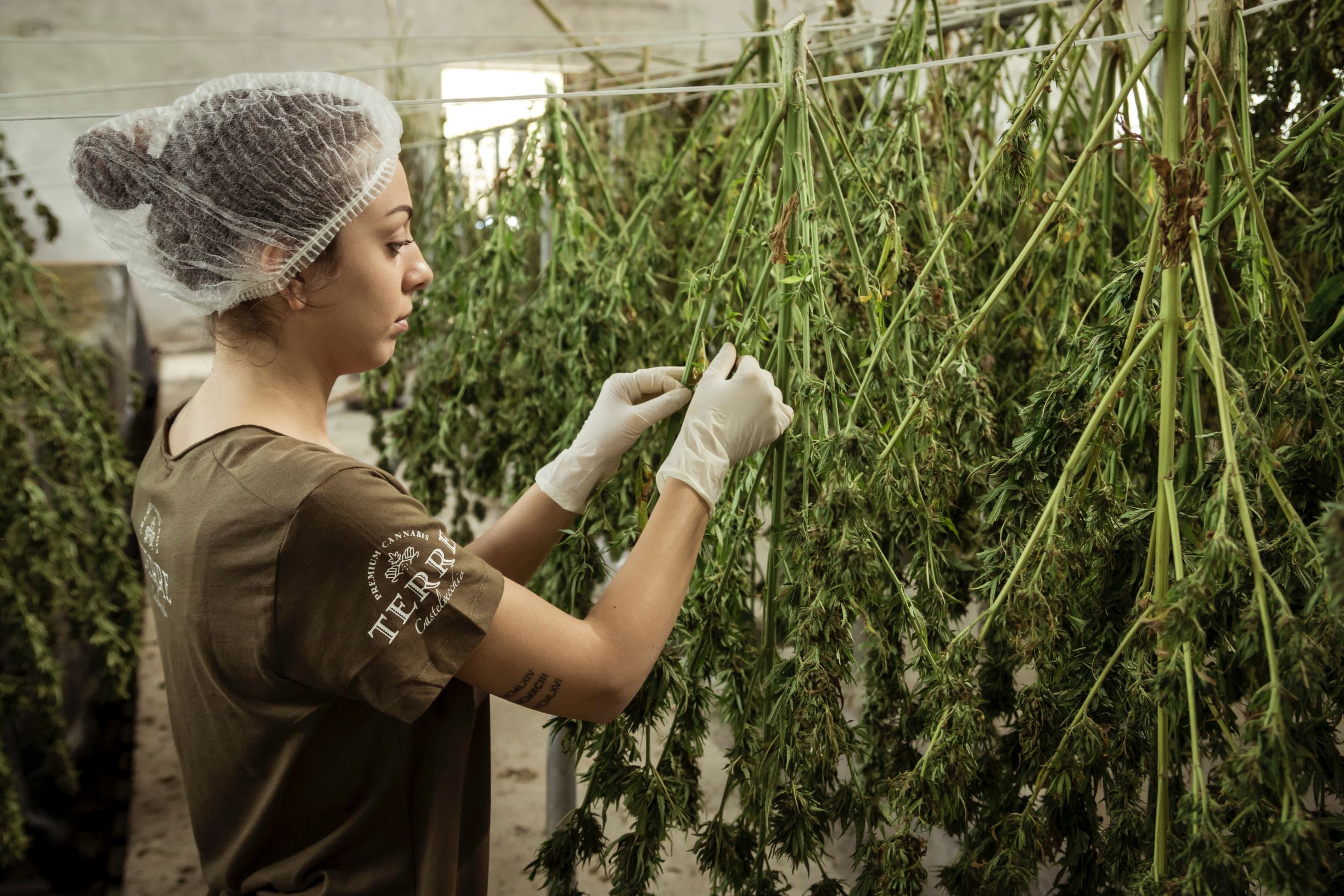Cannabiz founders Martin Lane and KimMcKay explain how they’re breaking the B2B publishing model to address the challenges of Australia’s fledgling legal cannabis industry.
Cannabiz, Australia’s first B2B media platform for the legal cannabis industry, was launched last month by Co-Founder and former CEO of Mumbrella, Martin Lane, and Klick X Founder Kim McKay.
The B2B platform aims to educate, connect and grow businesses in Australia’s legal cannabis industry – from growers, manufacturers, distributors, pharmacists, doctors, campaigners and trade associations. Content is delivered through news, analysis, a podcast, and soon a membership and live events.
A unique challenge for the fledgling industry is how it is perceived by industry groups, the medical profession and consumers, and it was the drive to solve this problem that led Lane and McKay to collaborate.
Lane and McKay’s unique set of skills in publishing, brand building, PR and marketing not only meets the needs of the cannabis industry, it’s also allowed for them to pursue a different business model to traditional B2B publishers.
TMSN Editor Lyndsie Clark spoke to Lane and McKay about how Cannabiz began, the challenges of promoting a fledgling and often misunderstood industry, and landing on a business model that could be the future for many publishers.
Assessing cannabis industry needs
McKay’s consulting company Klick X has offices in California and Hawaii, so she travels to the US often. While there, she says “I watched the cannabis industry launch, hit a crossroads, stall and excel. Our initial research came out of the potential I saw out of the US and my travels there. I could see that Australia could possibly go on that trajectory.”
She then embarked on convincing Lane that there was an opportunity to create something valuable for Australia’s fledgling industry.

Lane says “From my side, I went to Advertising Week in New York at the end of 2017 and there were whole sessions on cannabis, which was a bit mind boggling because in Australia the industry is very much a ‘super niche’.
“But in the US it was starting to go mainstream because of legalisation. So the focus wasn’t just around the medical benefits of cannabis, it was also around wearables and edibles. That was the first time I came back and was prepared to listen to Kim, and admit that she was right, and I’ve found myself doing that an awful lot ever since.”
From there, McKay and Lane began talking to the industry in Australia to assess their needs.

“We chatted to main industry bodies, we chatted to the ASX listed companies, we chatted to campaigners and doctors, we talked to a lot of people in the ecosystem,” says Lane.
He explains that they discovered Australia’s legal cannabis industry had particular challenges, and there wasn’t a media platform that tied all the aspects of the industry together.
“The cannabis industry is a community of people who might come at it from different angles, but all have the same aim, which is to make cannabis as widely available to as many people as possible.
“We found that there were titles that were talking about the ASX listed companies from an investment point of view, and the medical titles covered it a little bit from a medical point of view, but you didn’t have anyone knitting the whole ecosystem together and treating it like a community.”
And that’s where McKay and Lane landed on Cannabiz: a platform to connect the end-to-end cannabis industry.
Overhauling the cannabis brand
In addition to the tough regulations that face most therapeutic industries, Lane and McKay found that a core challenge of Australia’s legal cannabis industry came down to branding – a challenge that they were well placed to help the industry with.
“It’s an industry with all sorts of marketing challenges,” says Lane. “One big one at the moment is that the medicinal cannabis industry can’t market to consumers in Australia. They can only market to doctors under the regulations.
“And a lot of doctors haven’t been trained to understand the medical efficacy of cannabis. There are some really terrible stories of patients who feel like they can’t ask their doctor about it or they get dismissed or made to feel that they’re doing something wrong.”
“So there’s some work to do within the medical community to knock down some of those barriers and help an industry which has suffered from a bit of an image problem.”
McKay agrees, saying that the cannabis brand needs to go through “a bit of an overhaul”, which needs to happen at a government and stakeholder level before the industry gets to the point where it can market to consumers.
“It’s a huge job and one we’re absolutely willing to support the industry in doing,” she says.
And the need to market to consumers might not be that far away, with Australia’s Department of Health discussing amendments to the Poison Standard that would allow consumers to access cannabis oil in chemists without a prescription.
“At that point, the industry will need to be able to talk to consumers in a way that still fits within the regulations, which are still going to be fairly tightly drawn…that feels like a place where we can absolutely help.”
The challenges of marketing
The cannabis industry can’t rely on usual marketing techniques, MacKay explains. Both Facebook and Google reject advertising for cannabis on the assumption that ads containing the word point to websites promoting illicit drug use.
“You can’t do what people would consider traditional marketing now. Facebook and Google account for 80 per cent of digital advertising today, and they can’t be used by the legal cannabis industry,” she says.
“Brands have some real challenges to face. So when we started Cannabiz, like all good businesses, we didn’t think about what we could sell people, we thought about that problem we could solve. And marketing is going to be an actual real-world problem for a lot of cannabis businesses.
…when we started Cannabiz, like all good businesses, we didn’t think about what we could sell people, we thought about that problem we could solve.
Kim McKay, Co-Founder, Cannabiz.
“Everyone in the world has an opinion when you hear the word cannabis – positive or negative – but everyone has an emotional connection to that word. That’s tough in itself to overcome.
“We’re going to help them navigate through those channels, we’re going to help them build their own communities, we’re going to be that safe, guiding hand through these turbulent waters.
“We’re really excited to help solve that problem. I’m swinging my legs out of bed every day, hoping we get closer to getting this product available for more Australians, and then we can help those brands get it in those people’s hands,” says McKay.
Lane adds “Our role is very much to champion the industry, but also to hold a bit of mirror up and say, here are some opportunities, but here’s the best way that you can knock on those doors, here’s the best way that you can present yourselves, here’s how you can do positive PR, here’s how you can do smart marketing.
“And that’s not necessarily shouting about this wonder drug. It’s more subtle than that.”
Breaking the traditional publishing business model
Australia’s cannabis industry’s core need for marketing and PR has meant that McKay and Lane have stepped away from the traditional publishing business model. Instead of soliciting advertising revenue, Cannabiz will generate revenue through communications consultancy and subscriptions.
“We’re living in interesting times from a publishing point of view,” Lane says.
“I built a publishing business 12 years ago, which was based on volume and advertising and events, and sitting here in COVID-19 2020, it doesn’t feel like that’s a business model that’s going to be sustainable.
“I think we’re at the point where it’s okay for us to charge for our expertise. And that expertise is around, not just publishing, but consulting, marketing, PR advice, research, white papers, all of those things that really add value.
“We’re not interested in aggregated content that you can get from elsewhere, because that doesn’t have any tangible value.
“We need to be able to pay for the journalism and content that we produce, but we’re not following the model of building a free audience and then throw loads of ads at them, because that just doesn’t feel like the model for 2020.
…we’re not following the model of building a free audience and then throw loads of ads at them, because that just doesn’t feel like the model for 2020.
Martin Lane, Co-Founder, Cannabiz.
“The point is that we have the skills and expertise that the industry, we hope, will benefit from. And that’s where we want to add value.”
McKay agrees: “From day one, we knew advertising was not our model. We just knew we were there to solve a problem; we would empower the industry to help it to grow. And to do that we need to show them all the opportunities for growth: through content, through collaborations, through helping them build a consumer audience, and through our consulting.”
But Lane recognises that it’s taken him a long time to have the confidence to rely on a business model that focuses on consultancy services, pointing to McKay’s experience in the consultancy business as getting him across the line.
“I’m very lucky that I have a business partner who has those skills,” he says. “I think many publishers don’t have the confidence to go down this path, because they’re so used to giving their content away for free then hoping somebody else will pay for it, i.e. an advertiser.
“Working with somebody who’s used to charging for their services is actually really helpful from a publisher point of view. I’m not sure I would have gotten there on my own, to be honest, and I think that’s probably the thing that a lot of publishers are wrestling with.
“It’s having the confidence to say, we are going to charge for our expertise. And I think that’s a mindset that’s going to take time to change.
McKay laughs “I have no issue charging people for a minute of my time. I hope that our story helps a lot of other publishers out there, because if they can change that mindset, that’s going to really help them.”
Lane and McKay’s tips for a successful B2B publishing business in 2020
1. Build a community
Lane says that building a community is important, “and not publishing at it, but publishing to it and from within it.”
“So what we’re trying to do is give everybody a voice within Cannabiz and really build out that community because it feels like that’s the way that we’re going to help the industry make meaningful change. And I think that’s true of any industry sector you’re in.
“As publishers, what we can do is help the industry focus on what the ultimate goal is. Our job is to help the industry grow and work together even though everybody’s got their own businesses to run and they’ve got their own things to worry about. Ultimately, everybody wins if the industry wins,” he says.
2. Be a hero maker
McKay says it’s also important for B2B publishers to be customer-focused.
“B2B businesses are really B2C because you still have customers that need to have a wonderful experience with you. Your job is to make them the hero, share their stories, and I think sometimes the phrase B2B trips a few people up into forgetting the people element.
“In our vision sort of statement, we’ve got a few areas around how we want to act and how we want our entire team to be when they’re out there in the world, and one of them is to be the hero maker. We’re there to make heroes of people in the industry, not ourselves. And that’s the job I think of anyone in our situation.”
3. Understand the problem that you’re trying to solve
Both McKay and Lane say that publishers should have a good understanding of the problem that they are trying to solve, and make sure that their business model reflects that.
“Think about the user experience for your readers and your potential clients, and how you are going to deliver a service that meets their needs and provides a sustainable revenue base for you to continue to provide value to the industry,” says Lane.








Insightful and accurate. Marketing in the cannabis industry is going to be a marathon rather than a sprint. Companies are going to be continually hampered by overprotective regulations and will not only be battling restrictions from ‘above’ but also stigma from ‘below’ in the market. Very interesting to see how brands become creative to work within this space over the coming years. Many of these companies are celebrated at the Australian Cannabis Awards https://cannabisawards.com.au and the cannabis business directory called https://thegreenlist.biz